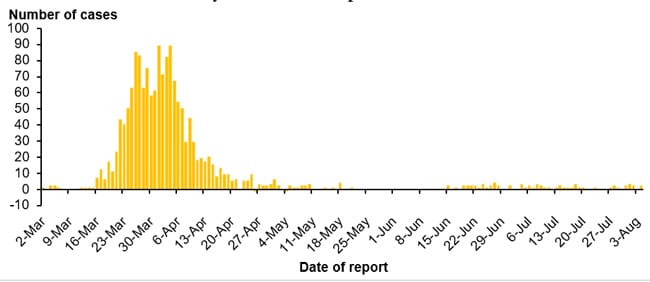New Zealand cautions on border reopening, announces industry relief funding
- Senior cabinet ministers have said that international students will not be permitted to travel to New Zealand this year
- The government has moved to “cushion the blow” of the immediate enrolment downturn, and set the stage for the sector’s long-term recovery, with NZ$52 million in targeted relief funding
New Zealand Education Minister Chris Hipkins sounded a cautious note during a 27 July media briefing, which focused in part on the introduction of a new recovery strategy and relief fund for the country's international education sector.
"COVID-19 has meant that international education providers, especially providers like English language schools have suffered a sudden and dramatic loss of revenue," said the Minister. "I know much of the recovery is dependent on when New Zealand will be able to reopen our borders to international students.
"As we've noted many times, the COVID-19 pandemic continues to rage overseas and we'd be expecting providers to plan for no international students – no additional international students – for the rest of this year with a view to bringing in smaller cohorts than they may have previously expected next year ."
Speaking to Times Higher Education, Universities New Zealand Chief Executive Chris Whelan said that country's higher education institutions understand that borders would be reopening “much later than we’d like and at much lower volumes than we’d like. But we also want an assurance that we can plan for a more optimistic scenario – opening not necessarily earlier, but once we can pretty much assure the public there is no chance that a student is going to get out into the community with COVID.”
Mr Whelan added that New Zealand's universities were laying plans to welcome “many tens of thousands of students” in 2021 via university-run quarantine centres. “It’s going to be a matter of how many students can come in each cohort, and how quickly we can ramp up,” he added.
Funding for recovery
Minister Hipkins appeared at the 27 July briefing with Prime Minister Jacinda Ardern who pointed out that the country's strong public health response to the pandemic would be a source of competitive advantage going forward.
"New Zealand's international education sector has an opportunity to benefit from our strong health response, which means we are one of the few countries in the world where students can come and study and be safe from COVID. This can be in the future a significant strategic advantage. Today we set out a path to recovery to help the sector rebuild and get our international education export sector back on track when we are able."
With a population of just over five million people, New Zealand has recorded 22 deaths from the pandemic and a combined total of just over 1,500 confirmed and probable cases through 5 August. The country has been widely lauded for its success in virtually eliminating active cases of COVID-19 in recent months.

The Prime Minister added during the briefing that, "International education is our fifth-largest export earner and contributed nearly NZ$5 billion to our economy in 2018. Like many sectors that rely on international visitors, international educators have suffered enormously due to the current travel restrictions. That's why today the government is investing NZ$51.6 million (US$35 million) from the COVID recovery fund to help protect jobs and stabilise the sector."
The funding is being delivered within a three-pronged long-term recovery plan for international education in New Zealand and will be distributed as follows.
- NZ$20 million in support for state and state-integrated schools "to employ the specialist international workforce to continue teaching and providing pastoral care to international students who remain in New Zealand".
- NZ$10 million for Private Training Establishments (PTEs) including English language schools to "buffer the sharp decline in revenue and maintain a foundation of PTEs for the recovery phase".
- NZ$10 million to develop new future-focused products and services, including new investments in online learning and in a "unified digital platform" for marketing and programme delivery.
- NZ$6.6 million for support services and other activities for international students.
- NZ$3 million for marketing activities in support of New Zealand’s education brand.
- NZ$1.5 million for English Language Schools to deliver English language training to migrants in New Zealand.
- NZ$500k to strengthen quality assurance processes for programmes delivered offshore.
“This funding builds on the work the Government has already been doing to support providers and students, including wage subsidies, enabling PTEs to hibernate, establishing an international student hardship fund, and removing the requirement for providers to pay [export taxes] in 2020 and 2021,” added Minister Hipkins.
Industry response
While educators welcomed the news of the funding package, questions remain about how much impact the current level of planned spending will have. Some have also expressed that a concrete plan to reopen borders to international students and to provide for their safe arrival in New Zealand would be a much more important step for the industry's recovery.
This is an especially salient point given the scale of the impact of an international enrolment downturn in 2020 and 2021, the full weight of which could run into several hundred million dollars for the university sector alone.
Opposition Member of Parliament Nicola Willis pointed out that the total spending anticipated in the recovery plan was a small fraction of the export value of the international education sector. Speaking to Radio New Zealand, Ms Willis said that, more than anything, educators need more certainty about the timeline and process for welcoming students back to the country. "What that requires is a clear plan for a secure quarantine system, and a secure border, that will allow international students to come back safely," she added.
For additional background, please see:
















